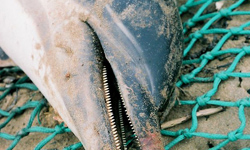Why U.S. "Dolphin-Safe" Tuna Isn't
 U.S. “dolphin-safe” tuna endangers the entire marine ecosystem. By narrowly focusing on fishing methods rather than results, today’s “dolphin-safe” labels permit and encourage fishing methods oblivious to the bycatch of sharks, turtles, juvenile tunas, sea birds and other sea life.
U.S. “dolphin-safe” tuna endangers the entire marine ecosystem. By narrowly focusing on fishing methods rather than results, today’s “dolphin-safe” labels permit and encourage fishing methods oblivious to the bycatch of sharks, turtles, juvenile tunas, sea birds and other sea life.
The current system is not transparent, tracked or verified. This results in consumer confusion and deception. Studies suggest a percentage of consumers actually believe that the “dolphin-safe” label guarantees that no dolphin meat is in the can of tuna. Even consumers who understand that the label refers to bycatch might believe that the tuna was sustainably caught without harm to dolphins. The truth is that under current U.S. labeling standards, bycatch, including that of dolphins, does in fact occur and is unknown in most cases.
Since implementation of the International Dolphin Conservation Program, dolphin mortalities in the Eastern Tropical Pacific (ETP) tuna fishery have dropped by more than 99%. That decline happened almost entirely before 1997 and has been sustained ever since. Fifteen years later, “dolphin-safe” labels are effectively a tool for corporate green-washing.
In 2012, the World Trade Organization ruled, after a full review of all of the scientific and empirical evidence, that “dolphin-safe” tuna standards established by Congress in 1990, while effective in motivating change at the time, are now outdated and, in fact, deceptive to U.S. consumers. The reality is that the U.S. law and "dolphin-safe" policy ONLY certifies that no harm occurred to dolphins if the tuna were caught in the ETP fishery. It found that even when thousands of dolphins are killed in the course of fishing for tuna outside of the ETP, the canned tuna bears the “dolphin-safe” label under the current labeling standards. More than 98% of the tuna in the U.S. market today is sourced from these and other unmonitored and untracked fisheries where thousands of dolphins are killed every year.
The WTO’s ruling was a victory for the movement for eco safe tuna and greater consumer information; a movement consistent with the policies of U.S. environmental groups like the World Wildlife Fund, Greenpeace and The Pew Charitable Trusts.




